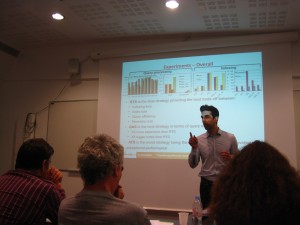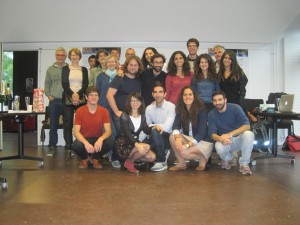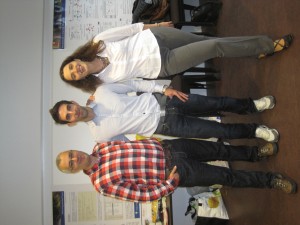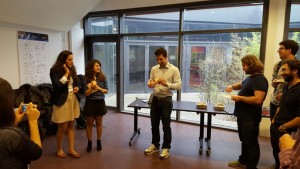On Monday, we had the pleasure to see one of our colleagues obtaining his PhD degree at the OAK Team. On September 21, Stamatis Zampetakis defended his PhD thesis entitled “Scalable algorithms for cloud-based Semantic Web data management”.
After the defense, the attendees
enjoyed the pot where Stamatis and his friends prepared several greek specialties.
The end of the defense allowed the student and the advisors to relax and celebrate a successful 5-year collaboration in a casual atmosphere.
Colleagues and friends kindly contributed with some special gifts which Stamatis will enjoy
for a big period of time.
Examining committee
Mme Ioana Manolescu, research director, Inria and Université Paris-Sud (thesis director)
M. François Goasdoué, professor, Université de Rennes 1 & Inria (thesis director)
M. Bernd Amann, professor, Université Pierre & Marie Curie (reviewer)
M. Tamer Özsu, professor, University of Waterloo, Canada (reviewer)
M. Serge Abiteboul, research director, Inria & ENS Cachan (examiner)
Mme. Christine Froidevaux, professor, Université Paris-Sud (examiner)
M. Patrick Valduriez, research director, Inria & Université de Montpellier (examiner)
Thesis abstract
In order to build smart systems, where machines are able to reason exactly like humans, data with semantics is a major requirement. This need led to the advent of the Semantic Web, proposing standard ways for representing and querying data with semantics. RDF is the prevalent data model used to describe web resources, and SPARQL is the query language that allows expressing queries over RDF data. Being able to store and query data with semantics triggered the development of many RDF data management systems.
The rapid evolution of the Semantic Web provoked the shift from centralized data management systems to distributed ones. The first systems to appear relied on P2P and client-server architectures, while recently the focus moved to cloud computing.
Cloud computing environments have strongly impacted research and development in distributed software platforms. Cloud providers offer distributed, shared-nothing infrastructures, that may be used for data storage and processing. The main features of cloud computing involve scalability, fault-tolerance, and elastic allocation of computing and storage resources following the needs of the users.
This thesis investigates the design and implementation of scalable algorithms and systems for cloud-based Semantic Web data management. In particular, we study the performance and cost of exploiting commercial cloud infrastructures to build Semantic Web data repositories, and the optimization of SPARQL queries for massively parallel frameworks.
First, we introduce the basic concepts around Semantic Web and the main components of cloud-based systems. In addition, we provide an extended overview of existing RDF data management systems in the centralized and distributed settings, emphasizing on the critical concepts of storage, indexing, query optimization, and infrastructure.
Second, we present AMADA, an architecture for RDF data management using public cloud infrastructures. We follow the Software as a Service (SaaS) model, where the complete platform is running in the cloud and appropriate APIs are provided to the end-users for storing and retrieving RDF data. We explore various storage and querying strategies revealing pros and cons with respect to performance and also to monetary cost, which is a important new dimension to consider in public cloud services.
Finally, we present CliqueSquare, a distributed RDF data management system built on top of Hadoop, incorporating a novel optimization algorithm that is able to produce massively parallel plans for SPARQL queries. We present a family of optimization algorithms, relying on n-ary (star) equality joins to build flat plans, and compare their ability to find the flattest possibles. Inspired by existing partitioning and indexing techniques we present a generic storage strategy suitable for storing RDF data in HDFS (Hadoop’s Distributed File System). Our experimental results validate the efficiency and effectiveness of the optimization algorithm demonstrating also the overall performance of the system.






